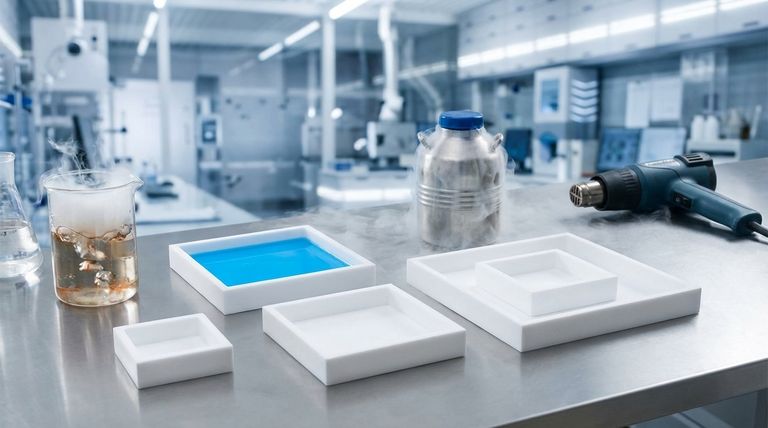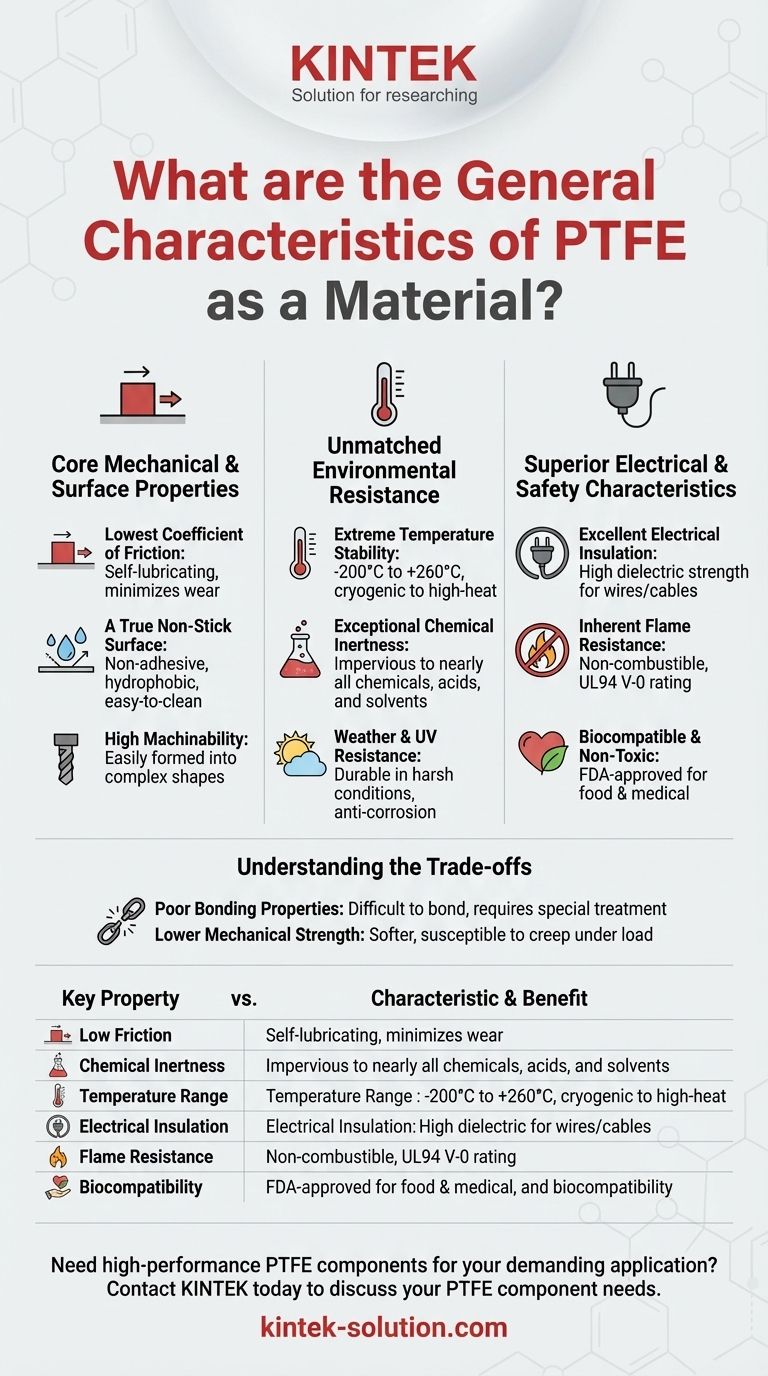Polytetrafluoroethylene (PTFE) is a high-performance fluoropolymer defined by three exceptional characteristics: an extremely low coefficient of friction, outstanding chemical inertness, and the ability to withstand a very wide range of temperatures. Often known by its most famous brand name, Teflon, its unique combination of properties makes it a versatile problem-solver in demanding industries.
PTFE's true value lies not in a single property, but in its rare combination of thermal stability, chemical resistance, and non-stick slipperiness. This unique profile makes it an essential material for applications where conventional plastics or metals would quickly fail.

Core Mechanical and Surface Properties
The physical nature of PTFE is central to its most common applications, from industrial bearings to non-stick coatings.
The Lowest Coefficient of Friction
PTFE possesses the lowest coefficient of friction of any known solid material. This property makes it exceptionally "slippery," creating a self-lubricating surface that minimizes wear and energy loss in moving parts.
A True Non-Stick Surface
Its very low surface tension creates a non-adhesive and hydrophobic surface. Materials do not readily stick to it, and it does not absorb water, which is critical for non-contaminating and easy-to-clean applications.
High Machinability
Despite its advanced properties, PTFE is a relatively soft plastic. It is considered highly machinable and can be easily formed into complex shapes and precise components.
Unmatched Environmental Resistance
PTFE is defined by its ability to maintain its integrity in environments that would degrade or destroy most other materials.
Extreme Temperature Stability
PTFE operates effectively across an exceptionally wide temperature range, typically from -200°C to +260°C (-328°F to +500°F). It remains functional and stable at both cryogenic and high-heat levels.
Exceptional Chemical Inertness
It is virtually impervious to chemical attack. The material shows high resistance to nearly all industrial chemicals, strong acids, alkalis, and aggressive organic solvents.
Weather and UV Resistance
The material is highly resistant to degradation from weather, UV light, and corrosion. This makes it suitable for long-term use in exposed or harsh conditions without becoming brittle or weak.
Superior Electrical and Safety Characteristics
Beyond its physical and chemical resilience, PTFE is also a premier material for electrical and safety-critical applications.
Excellent Electrical Insulation
PTFE is a superb electrical insulator with high dielectric strength and electrical resistance. This makes it an ideal material for coating high-frequency wires and cables.
Inherent Flame Resistance
It is naturally non-combustible and does not promote the spread of flame. This property earns it a high safety rating, often a UL94 V-0 flame rating, for use in electronics and construction.
Biocompatible and Non-Toxic
PTFE is inert, non-toxic, and is FDA-approved for food contact applications. Its biocompatibility also makes it suitable for use in certain medical devices.
Understanding the Trade-offs
No material is perfect for every situation. Being a trusted advisor means acknowledging a material's limitations to ensure it is selected correctly.
Poor Bonding Properties
The same non-stick quality that makes PTFE so valuable also makes it very difficult to bond to other materials using conventional adhesives. Special surface treatments like chemical etching are often required to achieve a strong bond.
Lower Mechanical Strength
Compared to engineering plastics or metals, pure PTFE is a softer material with lower tensile strength and a higher susceptibility to creep (deformation under sustained load). Its performance in structural applications can be enhanced with fillers like glass or carbon.
Making the Right Choice for Your Application
Selecting PTFE is about matching its unique strengths to a specific environmental challenge.
- If your primary focus is reducing friction: PTFE is the definitive choice for self-lubricating bearings, seals, and low-wear sliding components.
- If your primary focus is chemical resistance: Use PTFE for gaskets, vessel linings, and fluid handling components in aggressive chemical environments.
- If your primary focus is high-temperature electrical performance: It is ideal for wire insulation, connectors, and circuit board components operating in extreme thermal conditions.
- If your primary focus is a non-contaminating surface: Its inert, non-toxic, and FDA-approved status makes it perfect for food processing and medical applications.
Ultimately, PTFE is a specialized material engineered to perform reliably where extreme conditions of temperature, chemical exposure, or friction would cause others to fail.
Summary Table:
| Key Property | Characteristic | Benefit |
|---|---|---|
| Low Friction | Lowest coefficient of friction of any solid | Self-lubricating, reduces wear and energy loss |
| Chemical Inertness | Resistant to nearly all chemicals | Ideal for aggressive environments |
| Temperature Range | Stable from -200°C to +260°C | Performs in cryogenic and high-heat applications |
| Electrical Insulation | High dielectric strength | Excellent for high-frequency wiring and electronics |
| Flame Resistance | Non-combustible (UL94 V-0 rated) | Enhances safety in critical applications |
| Biocompatibility | FDA-approved, non-toxic | Suitable for medical and food contact uses |
Need high-performance PTFE components for your demanding application?
At KINTEK, we specialize in manufacturing precision PTFE seals, liners, labware, and custom components for the semiconductor, medical, laboratory, and industrial sectors. Our expertise ensures your parts deliver the unmatched chemical resistance, thermal stability, and low friction that PTFE is famous for.
We offer custom fabrication from prototypes to high-volume orders, prioritizing precision to meet your exact specifications.
Contact KINTEK today to discuss your PTFE component needs and let our expertise solve your most challenging material problems.
Visual Guide

Related Products
- Custom PTFE Square Trays for Industrial and Laboratory Use
- Custom PTFE Parts Manufacturer for Teflon Parts and PTFE Tweezers
- Custom PTFE Teflon Balls for Advanced Industrial Applications
- Custom PTFE Sealing Tapes for Industrial and High Tech Applications
- Custom PTFE Sleeves and Hollow Rods for Advanced Applications
People Also Ask
- What is the molecular structure of PTFE? The Key to Its Unmatched Chemical & Thermal Resistance
- What is Teflon and what is its chemical name? Unpacking the Science of PTFE
- What is PTFE and what class of plastics does it belong to? A Guide to High-Performance Fluoropolymers
- What environmental resistances does PTFE offer? Unmatched Durability for Harsh Conditions
- How does PTFE react to common solvents? Discover Its Near-Total Chemical Immunity



















